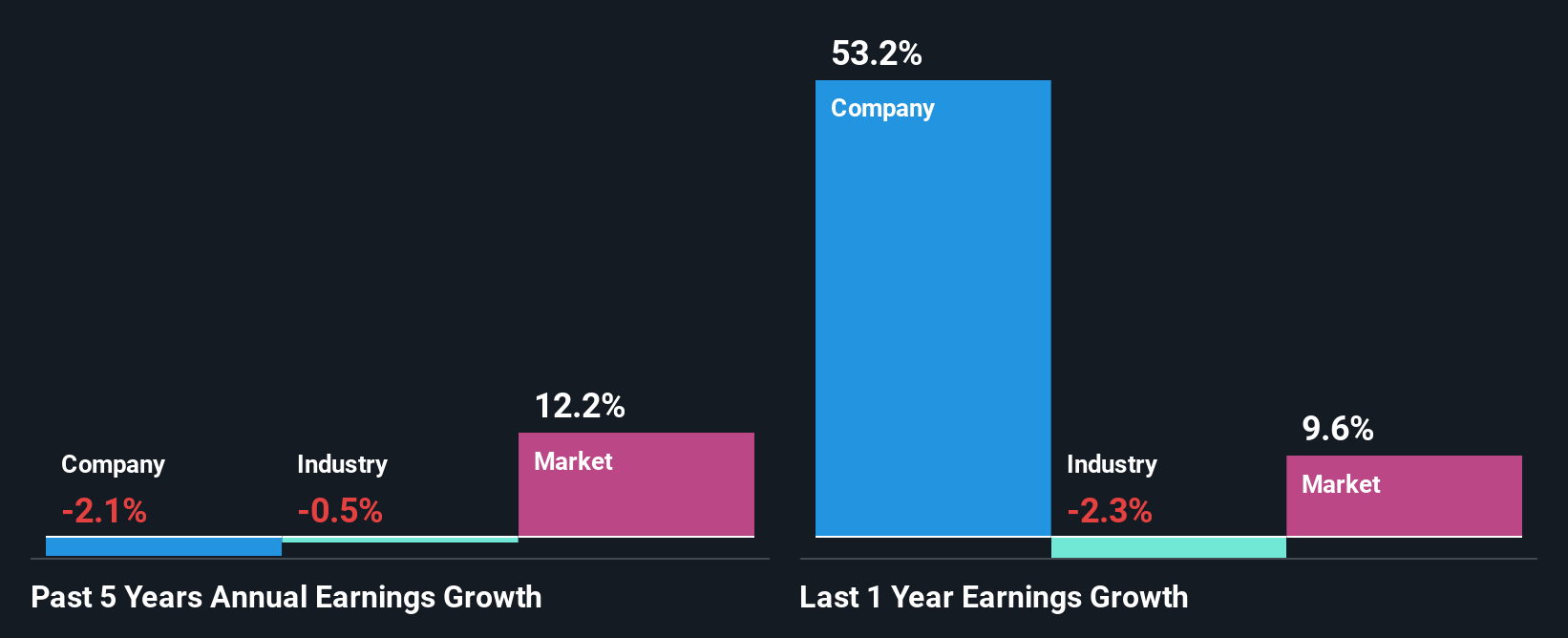Weak Financial Prospects Seem To Be Dragging Down Transcontinental Inc. (TSE:TCL.A) Stock
Transcontinental (TSE:TCL.A) has had a rough three months with its share price down 6.2%. Given that stock prices are usually driven by a company’s fundamentals over the long term, which in this case look pretty weak, we decided to study the company's key financial indicators. Particularly, we will be paying attention to Transcontinental's ROE today.
Return on equity or ROE is an important factor to be considered by a shareholder because it tells them how effectively their capital is being reinvested. In simpler terms, it measures the profitability of a company in relation to shareholder's equity.
How To Calculate Return On Equity?
Return on equity can be calculated by using the formula:
Return on Equity = Net Profit (from continuing operations) ÷ Shareholders' Equity
So, based on the above formula, the ROE for Transcontinental is:
9.4% = CA$177m ÷ CA$1.9b (Based on the trailing twelve months to July 2025).
The 'return' is the profit over the last twelve months. That means that for every CA$1 worth of shareholders' equity, the company generated CA$0.09 in profit.
Check out our latest analysis for Transcontinental
What Is The Relationship Between ROE And Earnings Growth?
We have already established that ROE serves as an efficient profit-generating gauge for a company's future earnings. Based on how much of its profits the company chooses to reinvest or "retain", we are then able to evaluate a company's future ability to generate profits. Generally speaking, other things being equal, firms with a high return on equity and profit retention, have a higher growth rate than firms that don’t share these attributes.
Transcontinental's Earnings Growth And 9.4% ROE
On the face of it, Transcontinental's ROE is not much to talk about. However, its ROE is similar to the industry average of 11%, so we won't completely dismiss the company. But Transcontinental saw a five year net income decline of 2.1% over the past five years. Remember, the company's ROE is a bit low to begin with. Hence, this goes some way in explaining the shrinking earnings.
Next, when we compared with the industry, which has shrunk its earnings at a rate of 0.5% in the same 5-year period, we still found Transcontinental's performance to be quite bleak, because the company has been shrinking its earnings faster than the industry.

Earnings growth is a huge factor in stock valuation. The investor should try to establish if the expected growth or decline in earnings, whichever the case may be, is priced in. By doing so, they will have an idea if the stock is headed into clear blue waters or if swampy waters await. One good indicator of expected earnings growth is the P/E ratio which determines the price the market is willing to pay for a stock based on its earnings prospects. So, you may want to check if Transcontinental is trading on a high P/E or a low P/E, relative to its industry.
Is Transcontinental Using Its Retained Earnings Effectively?
Transcontinental has a high three-year median payout ratio of 65% (that is, it is retaining 35% of its profits). This suggests that the company is paying most of its profits as dividends to its shareholders. This goes some way in explaining why its earnings have been shrinking. The business is only left with a small pool of capital to reinvest - A vicious cycle that doesn't benefit the company in the long-run.
In addition, Transcontinental has been paying dividends over a period of at least ten years suggesting that keeping up dividend payments is way more important to the management even if it comes at the cost of business growth. Existing analyst estimates suggest that the company's future payout ratio is expected to drop to 36% over the next three years. Despite the lower expected payout ratio, the company's ROE is not expected to change by much.
Summary
In total, we would have a hard think before deciding on any investment action concerning Transcontinental. As a result of its low ROE and lack of much reinvestment into the business, the company has seen a disappointing earnings growth rate. Further, on studying current analyst estimates, we found that the company's earnings growth is expected to be pretty much the same. Are these analysts expectations based on the broad expectations for the industry, or on the company's fundamentals? Click here to be taken to our analyst's forecasts page for the company.
Valuation is complex, but we're here to simplify it.
Discover if Transcontinental might be undervalued or overvalued with our detailed analysis, featuring fair value estimates, potential risks, dividends, insider trades, and its financial condition.
Access Free AnalysisHave feedback on this article? Concerned about the content? Get in touch with us directly. Alternatively, email editorial-team (at) simplywallst.com.
This article by Simply Wall St is general in nature. We provide commentary based on historical data and analyst forecasts only using an unbiased methodology and our articles are not intended to be financial advice. It does not constitute a recommendation to buy or sell any stock, and does not take account of your objectives, or your financial situation. We aim to bring you long-term focused analysis driven by fundamental data. Note that our analysis may not factor in the latest price-sensitive company announcements or qualitative material. Simply Wall St has no position in any stocks mentioned.
About TSX:TCL.A
Transcontinental
Engages in the flexible packaging business in Canada, the United States, Latin America, the United Kingdom, and internationally.
Very undervalued with flawless balance sheet and pays a dividend.
Similar Companies
Market Insights
Community Narratives



